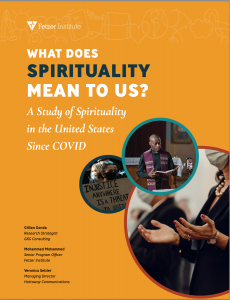STUDY SHOWS SPIRITUALITY AND FAITH AID PEOPLE FACING ISOLATION AND DESPAIR
“These innovative data show that spirituality is like a vaccine, inoculating people against isolation and
despair.””
KALAMAZOO, MICHIGAN, UNITED STATES, January 17, 2024 /EINPresswire.com/ -- A study released this week shows the positive effects of spiritual and religious engagement during COVID and similar times of challenge. The Fetzer Institute-funded study “What Does Spirituality Mean to Us? A Study of Spirituality in the United States Since COVID” sought to uncover shifts in the nation’s understanding of faith and spirituality in the aftermath of the COVID-19 pandemic. The study was a two-year follow-up to Fetzer’s groundbreaking 2020 study of spirituality.— Professor David Campbell, Notre Dame
“The data produced through this project is like the Webb telescope, only instead of distant stars, it has revealed the interior lives of many Americans—how they think and feel about their relationship to a higher power,” writes University of Notre Dame Professor David Campbell in the study’s introduction. “These innovative data show that spirituality is like a vaccine, inoculating people against isolation and despair.”
Conducted by the National Opinion Research Center (NORC) at the University of Chicago at the end of the pandemic, the study surveyed 3,651 people from a probability-based sample of the U.S. English-speaking population ages 18 and over. The data, collected in fall 2022, was then compared with the Fetzer Institute’s 2020 study (“What Does Spirituality Mean to Us? A Study of Spirituality in the United States”) to determine whether people experienced changes in their faith and spiritual lives during times of challenge.
“We believe that faith and spirituality are essential to human flourishing. The Fetzer Institute funded these studies to learn about how individuals in the U.S. describe their relationship with the sacred and whether that changes when facing a global challenge like COVID,” noted Fetzer Institute President and CEO Bob Boisture.
Among the study’s findings:
• Engaging in prayer, art, and time in nature were the most frequent practices reported by the nearly
two-thirds of interviewees who consider themselves both spiritual and religious.
• Survey participants reported that almost every spiritual activity they practiced supported their
spiritual growth and mental well-being.
• Seven out of ten people said that being in nature gave them a sense of hope. Nearly three-quarters of
people found prayer—however they define it—helped them endure difficulties.
The new study and its predecessor affirm—through interviews, focus groups, and two surveys—that spirituality is an inward and outward experience: it offers a sense of identity, offers tangible benefits, defines individual and group practices, infuses daily practices and experiences, and supports religious life, our search for meaning and purpose, and our connections to the transcendent. Subtle but notable differences in findings between the 2020 and the post-COVID survey reflect that toward the latter stages of the pandemic, people experienced:
• a little more doubt in a higher power;
• a little less feeling of connection to a higher power, all of humanity, the natural world;
• a little less aspiration to be spiritual; and
• a little less engagement in spiritual and/or religious activities.
The new data show that nearly 60 percent of people reported one or more challenges during the COVID pandemic, such as the loss of a loved one, loss of employment, or financial setback—combined with fewer opportunities for spiritual or religious gatherings. These realities could explain some of the declines in religious and spiritual beliefs and practices, according to the report.
At the same time, the study found that people who reported improved mental and spiritual health after the pandemic noted expanded spiritual practices, experiences, and prosocial activity.
“This report offers an in-depth look at how the ‘spiritual rubber meets the road’ during a challenging bend in our human journey,” noted Professor Pamela Ebstyne King of the Fuller Theological Seminary’s Thrive Center for Human Development, where she also serves as executive director. “The spiritual landscape painted through these findings includes transcendence, the sacred, love, ethics, relationships and belonging, service, science and nature, practices, worship, and well-being. In these times of radical change in traditional religious congregations and education, these findings offer great hope for spiritual vitality in the United States.”
Both studies are available at https://fetzer.org/work/study-spirituality-america .
The survey data from both studies is archived at the American Religious Data Archive: https://www.thearda.com/data-archive?fid=NRSS2022 .
Roberto Lara Aranda
Fetzer Institute
+1 269-353-0562
email us here
Visit us on social media:
Facebook
Twitter
LinkedIn
Legal Disclaimer:
EIN Presswire provides this news content "as is" without warranty of any kind. We do not accept any responsibility or liability for the accuracy, content, images, videos, licenses, completeness, legality, or reliability of the information contained in this article. If you have any complaints or copyright issues related to this article, kindly contact the author above.

